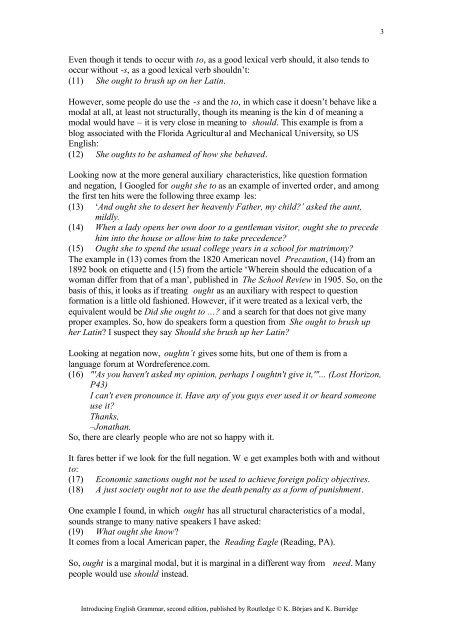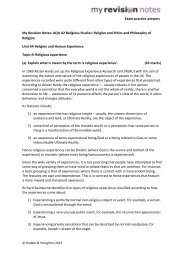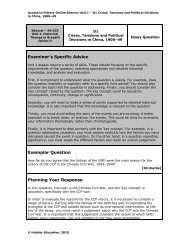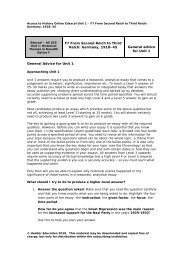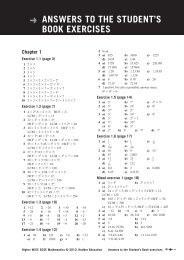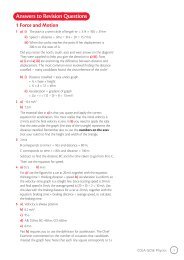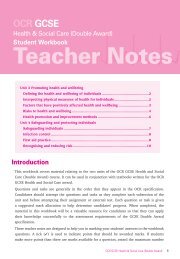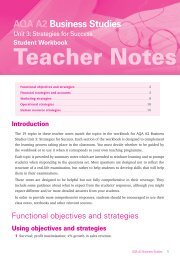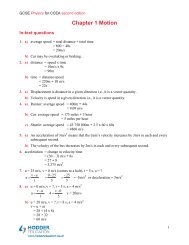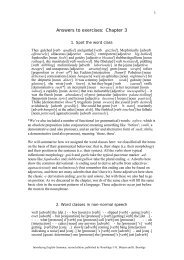You also want an ePaper? Increase the reach of your titles
YUMPU automatically turns print PDFs into web optimized ePapers that Google loves.
3Even though it tends <strong>to</strong> occur with <strong>to</strong>, as a good lexical verb should, it also tends <strong>to</strong>occur without -s, as a good lexical verb shouldn’t:(11) She ought <strong>to</strong> brush up on her Latin.However, some people do use the -s and the <strong>to</strong>, in which case it doesn’t behave like amodal at all, at least not structurally, though its meaning is the kin d of meaning amodal would have – it is very close in meaning <strong>to</strong> should. This example is from ablog associated with the Florida Agricultural and Mechanical University, so USEnglish:(12) She oughts <strong>to</strong> be ashamed of how she behaved.Looking now at the more general auxiliary characteristics, like question formationand negation, I Googled for ought she <strong>to</strong> as an example of inverted order, and amongthe first ten hits were the following three examp les:(13) ‘And ought she <strong>to</strong> desert her heavenly Father, my child?’ asked the aunt,mildly.(14) When a lady opens her own door <strong>to</strong> a gentleman visi<strong>to</strong>r, ought she <strong>to</strong> precedehim in<strong>to</strong> the house or allow him <strong>to</strong> take precedence?(15) Ought she <strong>to</strong> spend the usual college years in a school for matrimony?The example in (13) comes from the 1820 American novel Precaution, (14) from an1892 book on etiquette and (15) from the article ‘Wherein should the education of awoman differ from that of a man’, published in The School Review in 1905. So, on thebasis of this, it looks as if treating ought as an auxiliary with respect <strong>to</strong> questionformation is a little old fashioned. However, if it were treated as a lexical verb, theequivalent would be Did she ought <strong>to</strong> …? and a search for that does not give manyproper examples. So, how do speakers form a question from She ought <strong>to</strong> brush upher Latin? I suspect they say Should she brush up her Latin?Looking at negation now, oughtn’t gives some hits, but one of them is from alanguage forum at Wordreference.com.(16) "'As you haven't asked my opinion, perhaps I oughtn't give it,'"... (Lost Horizon,P43)I can't even pronounce it. Have any of you guys ever used it or heard someoneuse it?Thanks,–Jonathan.So, there are clearly people who are not so happy with it.It fares better if we look for the full negation. W e get examples both with and without<strong>to</strong>:(17) Economic sanctions ought not be used <strong>to</strong> achieve foreign policy objectives.(18) A just society ought not <strong>to</strong> use the death penalty as a form of punishment.One example I found, in which ought has all structural characteristics of a modal,sounds strange <strong>to</strong> many native speakers I have asked:(19) What ought she know?It comes from a local American paper, the Reading Eagle (Reading, PA).So, ought is a marginal modal, but it is marginal in a different way from need. Manypeople would use should instead.Introducing English Grammar, second edition, published by Routledge © K. Börjars and K. Burridge


